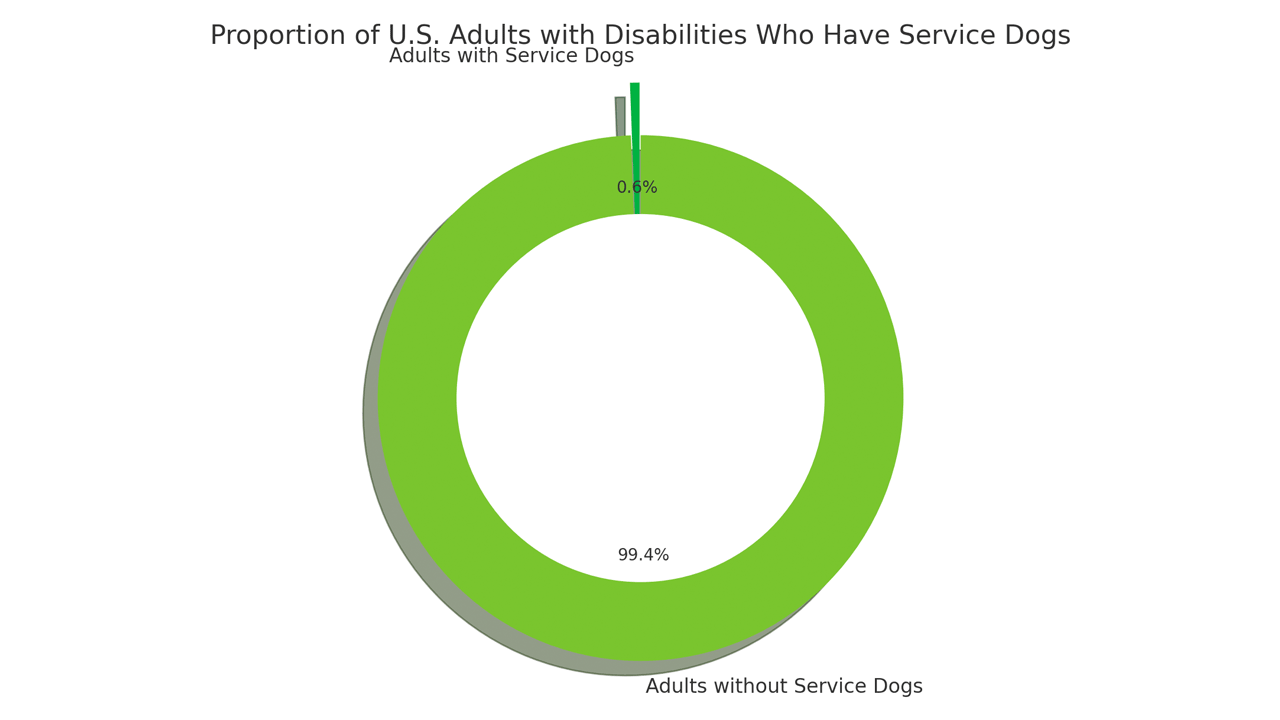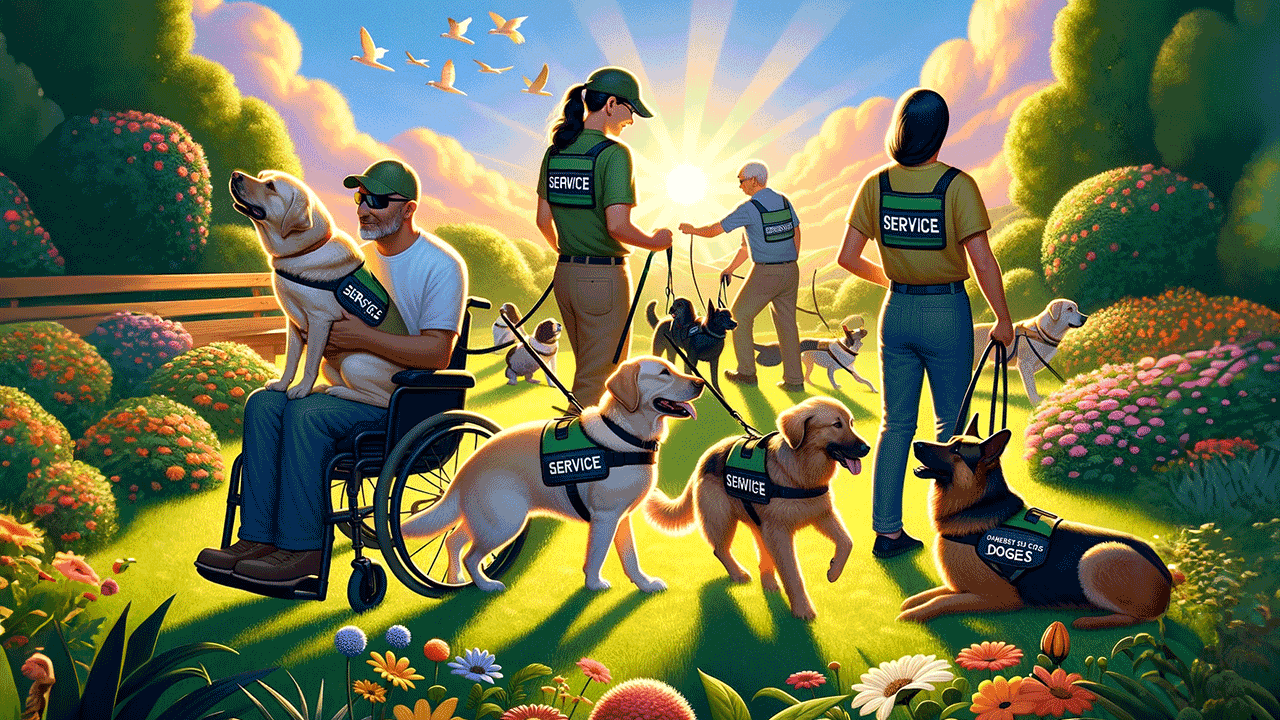Is It Ethical to Train Dogs as Service Animals
Key Takeaways:
- Service animals, particularly dogs, provide essential assistance to individuals with disabilities, enhancing their autonomy and quality of life.
- The ethics of training dogs as service animals hinge on ensuring the well-being of the dog, rights of the handler, and public access.
- Proper selection, training, and socialization of service dogs are vital to prevent exploitation and abuse.
- Handlers' rights must be balanced with public awareness and inclusive policies to support both the animal's and the handler's rights.
- Addressing concerns about animal welfare and ethical breeding practices are key to maintaining the integrity of service animal programs.
Percentage of Service Dogs in the USA vs Adults with Disabilities
The calculation reveals a striking figure: only 0.59% of adults with disabilities in the United States are assisted by service dogs. This translates to a staggering 99.41% of adults with disabilities who do not have the aid of these specialized animals. This vast discrepancy underscores a critical gap in service dog availability, suggesting that the majority of the disabled population may lack access to a resource that could significantly enhance their independence and quality of life. Whether due to shortages in trained animals, financial constraints, or lack of information, the low percentage of service dog usage calls attention to the need for increased support and resources in the realm of service animal training and distribution.

Introduction
Is It Ethical to Train Dogs as Service Animals? Well, service animals, especially dogs, play a vital role in the lives of people with disabilities, providing them with essential support and enhancing their autonomy and quality of life. They are specially trained to perform tasks that their handlers cannot do for themselves, from guiding those who are visually impaired to alerting individuals with diabetes to low blood sugar levels. For many people, the presence of a service animal means the difference between dependency and independence.
However, the training of these animals, particularly the ethical considerations involved, has been a subject of debate. While the advantages are clear in terms of the support they provide to their handlers, questions are raised about the welfare and rights of the animals themselves. Are the methods used to train these dogs humane? Is the lifestyle of a service animal fair to the dog? Additionally, there are concerns regarding the societal impact and the rights of people with service animals, including issues of public access and recognition of these animals' roles.
Ethical Considerations for Training Dogs as Service Animals
Well-being of the Dog:
The well-being of a service dog is paramount. These animals are not mere tools but sentient beings that require consideration and respect. Selecting the right dog for the job is the first ethical step. Not all dogs are suited to the demands of service work. The chosen dogs must have a temperament that is conducive to the patience and discipline required. It is not just about ability; it's about finding a match that ensures the dog can thrive in its role.
Once selected, the dog must be provided with proper training and socialization. This training should be done in a manner that is respectful and humane, utilizing positive reinforcement rather than punishment-based techniques. It is an ethical imperative to ensure that the dog leads a balanced life, with time for rest, play, and socialization, in addition to its service responsibilities.
Avoiding exploitation and abuse is also a critical ethical concern. Service dogs should not be overworked or placed in harmful situations. Regulatory standards and frequent welfare checks can ensure that service dogs are living healthy lives and are not subjected to mistreatment.
Rights of the Handler:
While the service dog's welfare is essential, the rights of the handler are equally important. Respecting the handler's autonomy and independence means recognizing the crucial role the service dog plays in their life. The bond between a service animal and its handler is profound and must be nurtured and protected. Handlers should be able to rely on their service animals without facing unnecessary barriers or discrimination.
Providing adequate support and resources to handlers is another ethical consideration. This includes access to information on how to properly care for their service animals and the means to do so. Support systems should be in place to assist handlers in maintaining the health and effectiveness of their service animals, ensuring a long and productive partnership.
Public Access:
Raising awareness of service animals and their rights is critical in addressing public access issues. Misunderstandings and lack of knowledge can lead to challenges for service animal handlers. It is essential that the public is educated on the roles these animals play and the rights afforded to them. Advocacy for inclusive policies and practices ensures that service animals and their handlers are welcomed and accommodated in all public spaces.
Public access also involves advocating for laws and regulations that support service animals' presence in various environments. This advocacy is not just about allowing access but ensuring that the environments are safe and conducive to the service animal's role.
Addressing Common Concerns
There are several common concerns regarding the ethics of training service animals. One question is whether training a dog as a service animal constitutes making them a slave to their handler's needs. However, ethical training methods emphasize the dog's willingness and happiness in their role. The aim is to create a mutually beneficial relationship where the dog enjoys its tasks and receives love, care, and respect in return.
Another ethical question is whether it is right to breed dogs specifically to become service animals. Responsible breeding programs can ensure that dogs are healthy and have the temperaments suitable for service work. However, these programs must be carefully monitored to prevent overbreeding and ensure the welfare of the breeding dogs.
Lastly, the issue of what happens to service dogs when they retire or become too old to work is a significant concern. Retirement plans should be in place to provide for the service dog's well-being throughout its entire life, including after its service career has ended. These plans ensure that service dogs are rewarded for their work with a comfortable and loving retirement.
Conclusion
In conclusion, the ethical training of dogs as service animals is a complex issue that involves balancing the needs and rights of both the animal and the handler. While there are valid concerns about the potential for exploitation and mistreatment, the benefits these animals provide to individuals with disabilities cannot be overstated. Ethical training practices, respectful public policies, and a commitment to the welfare of both the dogs and their handlers are essential components of a responsible service animal program. Those interested in further information on this topic can find a wealth of resources available that support ethical practices and provide support for individuals and service animals alike.
Read more:
- How Much Does it Cost to Train a Hunting Dog?
- How to Become a Dog Trainer in Missouri: The Ultimate Guide
- How to Train a Dogo Argentino
More Information
- Assistance Dogs International
- International Association of Assistance Dog Partners (IAADP)
- National Association of Service Dogs (NASD)
- Guide Dogs for the Blind
- Canine Companions for Independence
- American Kennel Club (AKC)
- Association of Professional Dog Trainers (APDT)
- Certification Council for Professional Dog Trainers (CCPDT-KA)
- Animal Behavior College







